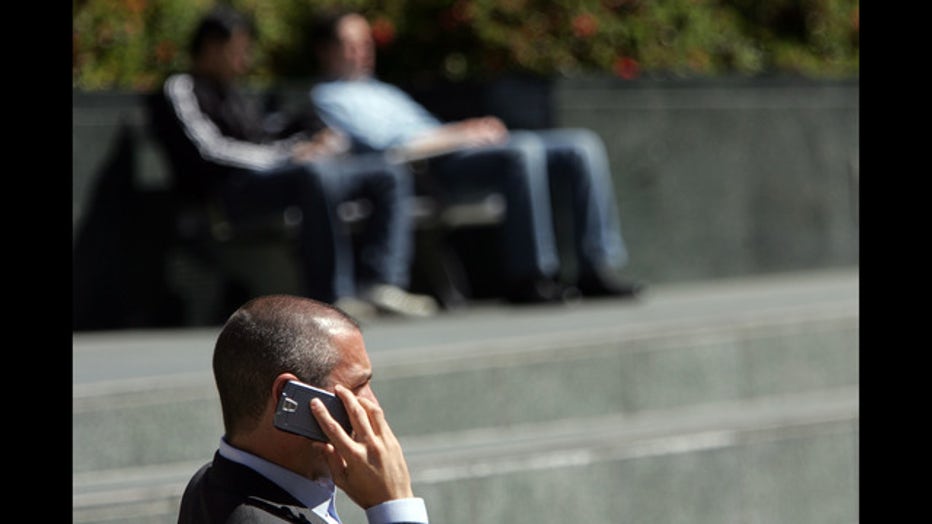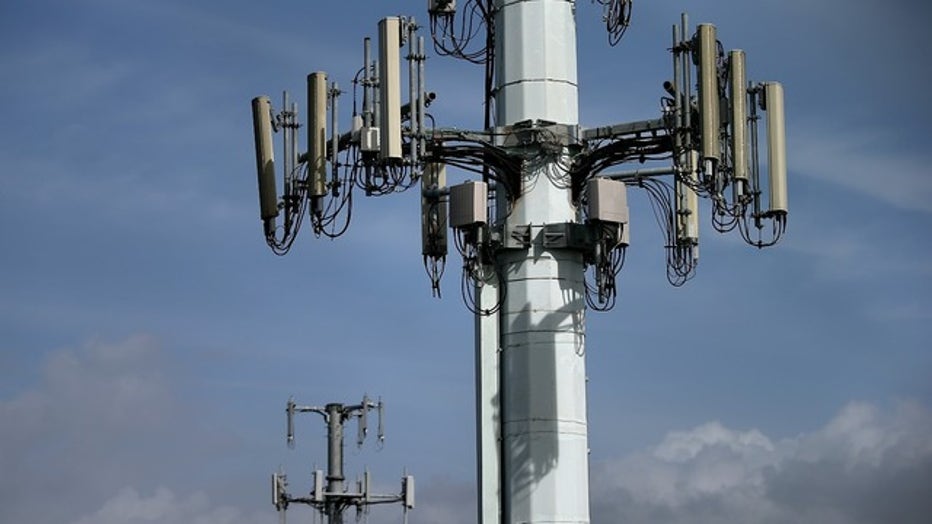Cell phones and cancer: New UC Berkeley study suggests cell phones sharply increase tumor risk
BERKELEY, Calif. - New UC Berkeley research draws a strong link between cell phone radiation and tumors, particularly in the brain.

File of cell phone user. New UC Berkeley research draws link between cell phone use and increase risk of tumors. (Photo by Justin Sullivan/Getty Images).
Researchers took a comprehensive look at statistical findings from 46 different studies around the globe and found that the use of a cell phone for more than 1,000 hours, or about 17 minutes a day over a ten year period, increased the risk of tumors by 60 percent.
Researchers also pointed to findings that showed cell phone use for 10 or more years doubled the risk of brain tumors.
Joel Moskowitz, director of the Center for Family and Community Health with the UC Berkeley School of Public Health conducted the research in partnership with Korea’s National Cancer Center, and Seoul National University. Their analysis took a comprehensive look at statistical findings from case control studies from 16 countries including the U.S., Sweden, United Kingdom, Japan, Korea, and New Zealand.
"Cell phone use highlights a host of public health issues and it has received little attention in the scientific community, unfortunately," said Moskowitz.
Cell phone use has increasingly become part of people’s daily lives, especially with the emergence of smartphones. Recent figures from the Pew Research Center showed that 97% of Americans now own a cell phone of some kind.
This, as more and more people have become dependent on their mobile phones as an integral mode of communication. In fact, an increasing number of people have ditched their landlines at home, relying on their cell phone as their sole device for telephone communication.
Figures from the Center for Disease Control and Prevention's National Center for Health Statistics found 61.8% of adults have decided to go wireless-only.
With the increased use of mobile devices, the research has been vast on their potential link to cancer. The findings have varied and at times been controversial.
Many studies looking into the health risks of cell phone use have been funded or partially funded by the cellular phone industry, which critics argue can skew research results.
"Moskowitz emphasized that these studies have been controversial as it is a highly sensitive political topic with significant economic ramifications for a powerful industry," Berkeley Public Health noted.
The position held by federal regulators point to a lack of evidence showing a direct link.
"To date, there is no consistent or credible scientific evidence of health problems caused by the exposure to radio frequency energy emitted by cell phones," the Food and Drug Administration stated on its website.
The FDA also said that the Federal Communications Commission has set a limit on radio frequency energy that "remains acceptable for protecting the public health."
SEE ALSO: San Jose neighbors oppose 5G cell equipment installed feet from homes
UC Berkeley researchers noted that in 2017, California regulators alerted the public of potential health risks related to cell phone use, although some felt the warning did not go far enough.
In its alert, the California Department of Public Health said, "Although the science is still evolving, some laboratory experiments and human health studies have suggested the possibility that long-term, high use of cell phones may be linked to certain types of cancer and other health effects."
The agency also provided advice on how to reduce exposure, including keeping phones away from your body and carrying devices in a backpack, briefcase, or purse. Health experts said cell phones should not be held in a pocket, bra, or belt holster, as a phone’s antenna tries to stay connected with a cell tower whenever it’s on, emitting radio frequency (RF) energy even when not in use.

A view of cellular communication towers in Emeryville, California. (Photo by Justin Sullivan/Getty Images)
Experts also suggested when not in use, putting the phone in airplane mode, which turns off cellular, Wi-Fi, and Bluetooth.
When on a call, experts advised avoid holding the phone up to your head and instead use the speaker feature or a headset.
Experts also said you should reduce or avoid use of your phone when there’s only one or two bars displayed showing the strength of connectivity. "Cell phones put out more RF energy to connect with cell towers when the signal is weak," health officials noted.
That’s also true when using a mobile device in a fast-moving car, bus, or train because the phone emits more RF energy to maintain connections to avoid dropping calls as it switches connections from cell tower to cell tower.
Ultimately, when it comes to cell phones, "distance is your friend," Moskowitz said. "Keeping your cellphone 10 inches away from your body, as compared to one-tenth of an inch, results in a 10,000-fold reduction in exposure. So, keep your phone away from your head and body," he advised.
SIGN UP FOR THE KTVU NEWSLETTER
Mobile phones have been around for decades, becoming widely accessible to the mainstream public in the 1980's. And as more people spend more time on the devices, researchers warned that could increase the risk of health problems related to their use. The study called for further in-depth research using exact data on the time spent on cell phones to confirm the latest findings.
Moskowitz, who has been researching and writing about the dangers of radiation from cell phones and cell towers for more than a decade, said publication of his findings have consistently led to increased calls for continued research. "…as soon as those stories went public in the media," he said, "I was contacted from survivors of cell phone radiation begging me to stay on this topic."
This latest study has been published in the International Journal of Environmental Research and Public Health.

